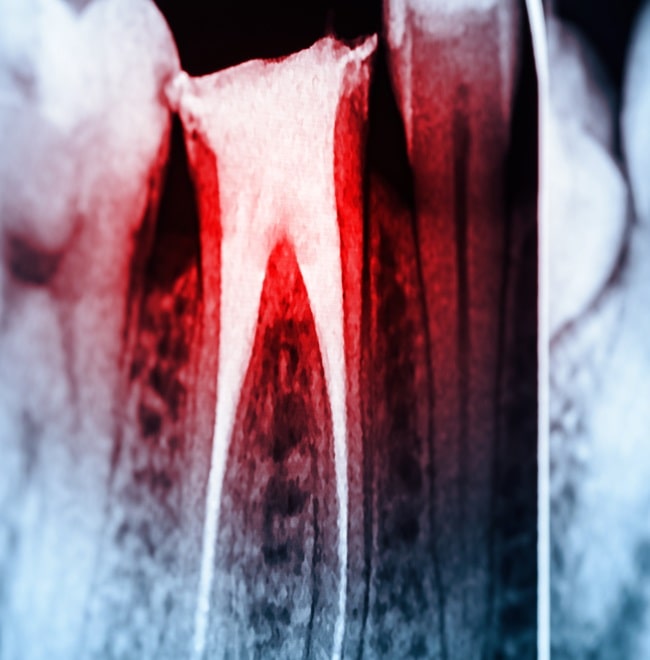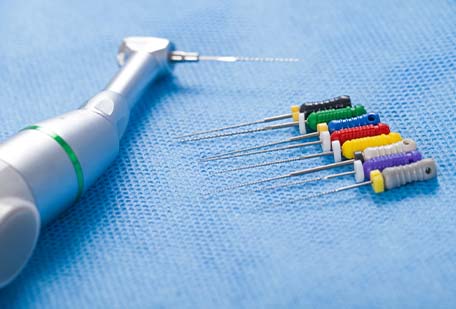Caulfeild Dental Centre
Root Canal Treatment
Root Canal Treatment in West Vancouver
Concerned you may require a root canal? While the procedure may seem worrying, it is routine with little discomfort. Root canals are often necessary to strengthen or save a diseased tooth. An experienced dentist can provide root canal treatments that are painless and simple.
Root canal therapy is done under local anesthetic/sedation, so patients experience minimal discomfort. The dentist eliminates decay/bacteria from the nerve, pulp, and root during the procedure. Then, antibiotics are used to disinfect the area; empty roots are filled and sealed to prevent further decay.
Root canals become necessary when oral bacteria invade the tooth’s pulp or the root. It occurs from untreated cavities or if the tooth is damaged/cracked from trauma. If left untreated, the root narrows and the tooth dies.
Do I Need a Root Canal?
When bacteria enter the tooth’s soft core, the pulp can become infected, inflamed, or necrotic (dead). Some signs which may indicate you require a root canal include:
- Constant Pain: The pain is usually felt deep in the bone of your tooth or manifests as severe pain in the jaw, face, or other teeth.
- Heat/Cold Sensitivity: Sensitivity may occur with hot/cold beverages or food. The pain tends to be sharp or like a dull ache and extends even after eating.
- Tooth Discolouration: Tooth infections can cause discolouration. A breakdown of the internal tissue or tooth trauma damages its roots leaving the tooth a blackish-grey.
- Swollen Gums: Swelling may increase and subside around the affected tooth. However, it will still be tender when touched.
- Gum “Pimple”: Also known as a parulis, abscess, or gum boil, it can ooze pus, leaving an unpleasant taste in the mouth and causing bad breath.
- Chipped/Cracked Teeth: Tooth trauma can allow bacteria to enter, leading to infection and inflammation. Despite the tooth not being broken, nerves may be damaged.
- Loose Tooth: Teeth, when infected, can feel looser. Acidic wastes from the death of a nerve soften bones around the root of the dying tooth.
At Caulfeild Dental, we can assess whether a root canal treatment is necessary. Many of the above symptoms can be associated with other issues. Upon examination, we can determine your best course of action.
How a Root Canal is Performed at Caulfeild Dental in Vancouver
Root canals involve three steps requiring between one to three sessions for completion. Patients receive a local anesthetic/sedative to decrease discomfort. A dental dam isolates the infected tooth from contaminants and saliva.
Steps include:
- Cleaning Your Root Canal: Everything is removed inside your root canal. Once numbed, the dentist creates a small access hole on the tooth’s surface. Then, the dead, diseased pulp tissue is removed using small files.
- Fill the Root Canal: The dentist will clean, shape, and decontaminate the hollow area using irrigation solutions and small files. Rubber-like material fills the tooth. Adhesive cement fully seals the canals.
- Adding a Filling or Crown: Your tooth is now more fragile. Teeth containing no pulp need nourishment from ligaments that attach a tooth to the bone. While there is adequate supply, over time, the tooth becomes brittle. Therefore, fillings and crowns provide protection.
Treatment is done in a single appointment. However, if curved canals, extensive infection, or multi-canals exist, you may require additional arrangements.
The Benefits of Root Canal Therapy
Despite sounding painful and scary, with technological advancements, patients experience little to no pain. Since local anesthetic is applied, patients remain comfortable during the entire procedure.
The main benefits include the following:
- Eliminates infection with neighbouring teeth
- Prevents tooth loss
- Improves tooth aesthetics
- Prevents the jaw from degeneration
- Improves oral health
- It is painless
Things to Consider After Root Canal Therapy
After a root canal, the gums and mouth will feel normal within one to two weeks. The only difference is the absence of pain and swelling. There are several things our patients can do after the procedure to ensure a quick recovery.
- Avoid Eating Right After the Procedure: The numbness should have disappeared entirely before eating. When you begin to eat, avoid biting on the affected tooth until tenderness has subsided.
- Elevate the Head and Postpone Eating: Prevent swelling by elevating the head as you sleep for a few nights. You can also place a cold compress on the area.
- Use Pain Medication: Dentists recommend Ibuprofen (Advil) to reduce discomfort and pain.
- Gargle Using Warm Salt Water: This prevents infection and keeps the mouth clean. The ratio is ½ teaspoon of salt to one cup of warm water.
- Avoid Irritants: These include consuming hot drinks, drinking with straws, smoking, and alcohol.
- Take a Physical Break: Avoid sports, running, physical labour, and hiking.
- Don’t Let Sensitivity Surprise You: There may be some sensitivity when biting into something cold or hot for a few weeks.
After treatment, keep the area surrounding the tooth clean. Floss and brush normally. Use an antibacterial mouthwash to prevent germs from causing infection. If you still have a temporary filling, refrain from eating on the treated tooth until the crown is placed.
Risks of a Root Canal Therapy
Despite sounding painful and scary, with technological advancements, patients experience little to no pain. Since local anesthetic is applied, patients remain comfortable during the entire procedure.
If you have a fever or facial swelling, you may receive antibiotics before treatment. It eliminates infection and reduces pain. The procedure is like receiving a large filling, yet the treatment is more prolonged.
At Caulfeild Dental, we ensure you are kept comfortable throughout the procedure. We use recent technology, making everything as painless as possible.
Choose Caulfeild Dental for Root Canal Treatment in West Vancouver
Contrary to public opinion, technological advancements make having a root canal relatively painless. While it may appear there are many steps involved in root canal treatment, most patients are out within 30 minutes to 1 hour.
Patients can expedite recovery time by taking things slowly regarding eating, managing pain/swelling, and reducing physical activity. The procedure’s discomfort generally involves some swelling and tenderness around the area. Patients can manage this with cold compresses and pain medication.
At Caulfeild Dental, we are your root canal specialists. By incorporating the latest technology, we can provide relatively pain-free treatments. We can provide tips on decreasing discomfort and instruct you on a speedy recovery.
Root Canal Treatment FAQ
Is a root canal painful?
With advancements in technology in addition to anesthesia, root canals are no longer painful. You may experience discomfort once the sedative wears off, but it can be effectively managed.
How long does the procedure take?
On average, the procedure takes 30-260 minutes. Treatment with a larger tooth containing several roots can extend to an hour and a half.
General Inquiries
Looking for more information? Feel free to contact us and we will get back to you as soon as possible.
"*" indicates required fields
Accepting New Patients




